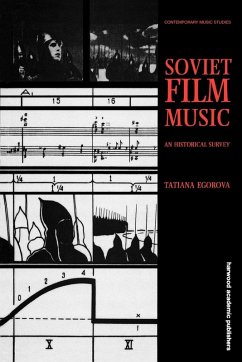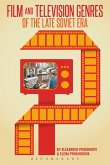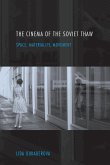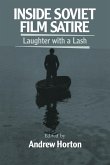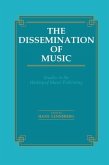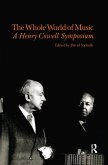Tatiana Egorova
Soviet Film Music
Tatiana Egorova
Soviet Film Music
- Broschiertes Buch
- Merkliste
- Auf die Merkliste
- Bewerten Bewerten
- Teilen
- Produkt teilen
- Produkterinnerung
- Produkterinnerung
First Published in 1998. Routledge is an imprint of Taylor & Francis, an informa company.
Andere Kunden interessierten sich auch für
![Film and Television Genres of the Late Soviet Era Film and Television Genres of the Late Soviet Era]() Alexander ProkhorovFilm and Television Genres of the Late Soviet Era41,99 €
Alexander ProkhorovFilm and Television Genres of the Late Soviet Era41,99 €![Cinema of the Soviet Thaw Cinema of the Soviet Thaw]() Lida OukaderovaCinema of the Soviet Thaw29,99 €
Lida OukaderovaCinema of the Soviet Thaw29,99 €![Inside Soviet Film Satire Inside Soviet Film Satire]() Andrew Horton (ed.)Inside Soviet Film Satire48,99 €
Andrew Horton (ed.)Inside Soviet Film Satire48,99 €![What's the Matter with Today's Experimental Music? What's the Matter with Today's Experimental Music?]() Leigh LandyWhat's the Matter with Today's Experimental Music?144,99 €
Leigh LandyWhat's the Matter with Today's Experimental Music?144,99 €![Art & Science of Music Therapy Art & Science of Music Therapy]() Bruce Saperston / Robert West / Tony Wigram (eds.)Art & Science of Music Therapy68,99 €
Bruce Saperston / Robert West / Tony Wigram (eds.)Art & Science of Music Therapy68,99 €![Dissemination of Music Dissemination of Music]() Dissemination of Music63,99 €
Dissemination of Music63,99 €![Whole World of Music Whole World of Music]() David Nicholls (ed.)Whole World of Music73,99 €
David Nicholls (ed.)Whole World of Music73,99 €-
-
-
First Published in 1998. Routledge is an imprint of Taylor & Francis, an informa company.
Produktdetails
- Produktdetails
- Verlag: Routledge
- Seitenzahl: 328
- Erscheinungstermin: 23. Dezember 1997
- Englisch
- Abmessung: 234mm x 156mm x 18mm
- Gewicht: 500g
- ISBN-13: 9783718659111
- ISBN-10: 3718659115
- Artikelnr.: 63378945
- Herstellerkennzeichnung
- Libri GmbH
- Europaallee 1
- 36244 Bad Hersfeld
- gpsr@libri.de
- Verlag: Routledge
- Seitenzahl: 328
- Erscheinungstermin: 23. Dezember 1997
- Englisch
- Abmessung: 234mm x 156mm x 18mm
- Gewicht: 500g
- ISBN-13: 9783718659111
- ISBN-10: 3718659115
- Artikelnr.: 63378945
- Herstellerkennzeichnung
- Libri GmbH
- Europaallee 1
- 36244 Bad Hersfeld
- gpsr@libri.de
Tatiana Egorova
1: 1917-1941; 1: Music and silent cinema. The alternative: pianist versus
composer; 2: Evolution from the silent to the sound film. The duality of
music during this transitional period in film history; 3: General
characteristics of the main types of musical dramaturgy in the 1930s and
early '40s; 4: The symphonic type of dramaturgy; 5: The role of music in
creating a mythicised image of socialism. Song in the service of ideology:
the musical film comedies of Alexandrov and Pyriev; 6: The formation of
other genres in musical cinema; 7: The development of film music in the
cinema of the Soviet Republics; 8: Elaboration of the idea of sound-visual
counterpoint in the film Alexander Nevsky; 2: 1941-1958; 9: The fortunes of
film music in the hard times of the War; 10: Problems of 'song' film; 11:
Extending the bounds of the musical film: initial steps towards mastering
the genres of film-opera and film-operetta; 12: A breakthrough in
sound-visual cinema: Ivan the Terrible by Eisenstein and Prokofiev; 13:
Music in the post-war cinema of the late forties and early fifties. The
period of imposed compromise and conformism; 14: Crisis in the genre of
musical comedy film; 15: Music in the role of step-daughter. Multiple music
clichés in the genre of biographical film; 16: Russian classical opera and
ballet in the cinema of the '50s: new attempts at relationships; 17: The
ideological function of music in the war film; 18: A wind of change: film
music of the post-Stalinist period; 19: Music in screen versions of works
from world literature; 3: 1959-1969; 20: Change of fortune. New means of
expression in the language of film music. Evolution from sound-musical
illustration towards the creation of an integral film sound-world; 21: Song
in the cinema of the '60s. Crystallization of a monothematic model in the
musical drama of the song film; 22: The mixed and chamber types of musical
dramaturgy; 23: Music by Nadezhda Simonyan and Dmitry Shostakovich in film
versions of Chekhov and Shakespeare; 24: An upsurge of interest in musical
cinema. Ways of solving the problem of 'cinema and opera'. Katerina
Izmailova by Shostakovich and Shapiro; 25: The zenith of musical
achievements in the directors' cinema of the '60s: music for the films The
Shadows of Our Forgotten Ancestors, Andrei Rublev and No Ford in the Fire;
4: 1970-1985; 26: The rise and fall of film music in the period of
stagnation. The problem of choice: the semi-official film, the commercial
'hit' or auteur cinema; 27: Human tragedy as reflected in film music; 28:
Extending the expressive means of film music. A search for new models of
stylistic interaction between music and the other components of screen
synthesis; 29: Breakthrough into the future: film music in the work of
Artemyev, Schnittke, and Gubaidulina in the 1980s; 30: The cinema musical:
a change in orientation. A transition from the classics to the revue film
and the musical. The first Soviet screening of a rock-opera; 5: 1986-1991;
31: 'Black wave' aesthetics and music. The crisis of film music under
conditions of intellectual and spiritual depression in society, and the
development of tough naturalist cinema in the period of the disintegration
of the Soviet Union; 32: The innovative experiments of Alexander Sokurov
and Andrei Chernykh: creating a multi-layered polyphonic sound score and a
'musical' film without music
composer; 2: Evolution from the silent to the sound film. The duality of
music during this transitional period in film history; 3: General
characteristics of the main types of musical dramaturgy in the 1930s and
early '40s; 4: The symphonic type of dramaturgy; 5: The role of music in
creating a mythicised image of socialism. Song in the service of ideology:
the musical film comedies of Alexandrov and Pyriev; 6: The formation of
other genres in musical cinema; 7: The development of film music in the
cinema of the Soviet Republics; 8: Elaboration of the idea of sound-visual
counterpoint in the film Alexander Nevsky; 2: 1941-1958; 9: The fortunes of
film music in the hard times of the War; 10: Problems of 'song' film; 11:
Extending the bounds of the musical film: initial steps towards mastering
the genres of film-opera and film-operetta; 12: A breakthrough in
sound-visual cinema: Ivan the Terrible by Eisenstein and Prokofiev; 13:
Music in the post-war cinema of the late forties and early fifties. The
period of imposed compromise and conformism; 14: Crisis in the genre of
musical comedy film; 15: Music in the role of step-daughter. Multiple music
clichés in the genre of biographical film; 16: Russian classical opera and
ballet in the cinema of the '50s: new attempts at relationships; 17: The
ideological function of music in the war film; 18: A wind of change: film
music of the post-Stalinist period; 19: Music in screen versions of works
from world literature; 3: 1959-1969; 20: Change of fortune. New means of
expression in the language of film music. Evolution from sound-musical
illustration towards the creation of an integral film sound-world; 21: Song
in the cinema of the '60s. Crystallization of a monothematic model in the
musical drama of the song film; 22: The mixed and chamber types of musical
dramaturgy; 23: Music by Nadezhda Simonyan and Dmitry Shostakovich in film
versions of Chekhov and Shakespeare; 24: An upsurge of interest in musical
cinema. Ways of solving the problem of 'cinema and opera'. Katerina
Izmailova by Shostakovich and Shapiro; 25: The zenith of musical
achievements in the directors' cinema of the '60s: music for the films The
Shadows of Our Forgotten Ancestors, Andrei Rublev and No Ford in the Fire;
4: 1970-1985; 26: The rise and fall of film music in the period of
stagnation. The problem of choice: the semi-official film, the commercial
'hit' or auteur cinema; 27: Human tragedy as reflected in film music; 28:
Extending the expressive means of film music. A search for new models of
stylistic interaction between music and the other components of screen
synthesis; 29: Breakthrough into the future: film music in the work of
Artemyev, Schnittke, and Gubaidulina in the 1980s; 30: The cinema musical:
a change in orientation. A transition from the classics to the revue film
and the musical. The first Soviet screening of a rock-opera; 5: 1986-1991;
31: 'Black wave' aesthetics and music. The crisis of film music under
conditions of intellectual and spiritual depression in society, and the
development of tough naturalist cinema in the period of the disintegration
of the Soviet Union; 32: The innovative experiments of Alexander Sokurov
and Andrei Chernykh: creating a multi-layered polyphonic sound score and a
'musical' film without music
1: 1917-1941; 1: Music and silent cinema. The alternative: pianist versus
composer; 2: Evolution from the silent to the sound film. The duality of
music during this transitional period in film history; 3: General
characteristics of the main types of musical dramaturgy in the 1930s and
early '40s; 4: The symphonic type of dramaturgy; 5: The role of music in
creating a mythicised image of socialism. Song in the service of ideology:
the musical film comedies of Alexandrov and Pyriev; 6: The formation of
other genres in musical cinema; 7: The development of film music in the
cinema of the Soviet Republics; 8: Elaboration of the idea of sound-visual
counterpoint in the film Alexander Nevsky; 2: 1941-1958; 9: The fortunes of
film music in the hard times of the War; 10: Problems of 'song' film; 11:
Extending the bounds of the musical film: initial steps towards mastering
the genres of film-opera and film-operetta; 12: A breakthrough in
sound-visual cinema: Ivan the Terrible by Eisenstein and Prokofiev; 13:
Music in the post-war cinema of the late forties and early fifties. The
period of imposed compromise and conformism; 14: Crisis in the genre of
musical comedy film; 15: Music in the role of step-daughter. Multiple music
clichés in the genre of biographical film; 16: Russian classical opera and
ballet in the cinema of the '50s: new attempts at relationships; 17: The
ideological function of music in the war film; 18: A wind of change: film
music of the post-Stalinist period; 19: Music in screen versions of works
from world literature; 3: 1959-1969; 20: Change of fortune. New means of
expression in the language of film music. Evolution from sound-musical
illustration towards the creation of an integral film sound-world; 21: Song
in the cinema of the '60s. Crystallization of a monothematic model in the
musical drama of the song film; 22: The mixed and chamber types of musical
dramaturgy; 23: Music by Nadezhda Simonyan and Dmitry Shostakovich in film
versions of Chekhov and Shakespeare; 24: An upsurge of interest in musical
cinema. Ways of solving the problem of 'cinema and opera'. Katerina
Izmailova by Shostakovich and Shapiro; 25: The zenith of musical
achievements in the directors' cinema of the '60s: music for the films The
Shadows of Our Forgotten Ancestors, Andrei Rublev and No Ford in the Fire;
4: 1970-1985; 26: The rise and fall of film music in the period of
stagnation. The problem of choice: the semi-official film, the commercial
'hit' or auteur cinema; 27: Human tragedy as reflected in film music; 28:
Extending the expressive means of film music. A search for new models of
stylistic interaction between music and the other components of screen
synthesis; 29: Breakthrough into the future: film music in the work of
Artemyev, Schnittke, and Gubaidulina in the 1980s; 30: The cinema musical:
a change in orientation. A transition from the classics to the revue film
and the musical. The first Soviet screening of a rock-opera; 5: 1986-1991;
31: 'Black wave' aesthetics and music. The crisis of film music under
conditions of intellectual and spiritual depression in society, and the
development of tough naturalist cinema in the period of the disintegration
of the Soviet Union; 32: The innovative experiments of Alexander Sokurov
and Andrei Chernykh: creating a multi-layered polyphonic sound score and a
'musical' film without music
composer; 2: Evolution from the silent to the sound film. The duality of
music during this transitional period in film history; 3: General
characteristics of the main types of musical dramaturgy in the 1930s and
early '40s; 4: The symphonic type of dramaturgy; 5: The role of music in
creating a mythicised image of socialism. Song in the service of ideology:
the musical film comedies of Alexandrov and Pyriev; 6: The formation of
other genres in musical cinema; 7: The development of film music in the
cinema of the Soviet Republics; 8: Elaboration of the idea of sound-visual
counterpoint in the film Alexander Nevsky; 2: 1941-1958; 9: The fortunes of
film music in the hard times of the War; 10: Problems of 'song' film; 11:
Extending the bounds of the musical film: initial steps towards mastering
the genres of film-opera and film-operetta; 12: A breakthrough in
sound-visual cinema: Ivan the Terrible by Eisenstein and Prokofiev; 13:
Music in the post-war cinema of the late forties and early fifties. The
period of imposed compromise and conformism; 14: Crisis in the genre of
musical comedy film; 15: Music in the role of step-daughter. Multiple music
clichés in the genre of biographical film; 16: Russian classical opera and
ballet in the cinema of the '50s: new attempts at relationships; 17: The
ideological function of music in the war film; 18: A wind of change: film
music of the post-Stalinist period; 19: Music in screen versions of works
from world literature; 3: 1959-1969; 20: Change of fortune. New means of
expression in the language of film music. Evolution from sound-musical
illustration towards the creation of an integral film sound-world; 21: Song
in the cinema of the '60s. Crystallization of a monothematic model in the
musical drama of the song film; 22: The mixed and chamber types of musical
dramaturgy; 23: Music by Nadezhda Simonyan and Dmitry Shostakovich in film
versions of Chekhov and Shakespeare; 24: An upsurge of interest in musical
cinema. Ways of solving the problem of 'cinema and opera'. Katerina
Izmailova by Shostakovich and Shapiro; 25: The zenith of musical
achievements in the directors' cinema of the '60s: music for the films The
Shadows of Our Forgotten Ancestors, Andrei Rublev and No Ford in the Fire;
4: 1970-1985; 26: The rise and fall of film music in the period of
stagnation. The problem of choice: the semi-official film, the commercial
'hit' or auteur cinema; 27: Human tragedy as reflected in film music; 28:
Extending the expressive means of film music. A search for new models of
stylistic interaction between music and the other components of screen
synthesis; 29: Breakthrough into the future: film music in the work of
Artemyev, Schnittke, and Gubaidulina in the 1980s; 30: The cinema musical:
a change in orientation. A transition from the classics to the revue film
and the musical. The first Soviet screening of a rock-opera; 5: 1986-1991;
31: 'Black wave' aesthetics and music. The crisis of film music under
conditions of intellectual and spiritual depression in society, and the
development of tough naturalist cinema in the period of the disintegration
of the Soviet Union; 32: The innovative experiments of Alexander Sokurov
and Andrei Chernykh: creating a multi-layered polyphonic sound score and a
'musical' film without music

